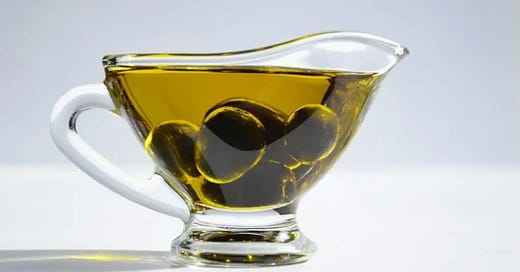Anointed With the Oil of Gladness
Thou lovest righteousness, and hatest wickedness: therefore God, thy God, hath anointed thee with the oil of gladness above thy fellows. Psalm 45:7
The Christian life is full of paradoxes and principles that work even though we may not be able to draw a direct line from an action to a promised outcome. We don’t always see what’s going on under the hood, or see the wires that lead from a particular light switch to the light it controls. Give and it shall be given unto you…how? How is it that humility is the way to exaltation?
One outcome we all pursue in our lives is gladness, or happiness. Yes, we know joy is a fruit of the Spirit, but we can’t always draw a direct line between obedience to the Spirit and joy. How is waking up earlier, laboring in prayer, reading the Bible, denying my flesh etc. going to give me joy? To believe that it will requires faith. However, entertainment appears more directly connected to our happiness… and requires no faith.
What does one do when he wants to be happy? Perhaps he watches a comedian and gets immediate laughs, not stopping to consider that once the show is over so are the laughs. Whatever the activity is, whether consuming entertainment or engaging in an activity like a hobby or a game, the faithless consumption of happiness ultimately fails to be a lasting investment in joy.
But what if we were not only glad and joyful, what if we were “anointed with the oil of gladness?”
In the Levitical law, oil was used to anoint the priests. The oil would be poured on the priest to consecrate him to his office. The formula for the oil produced a fragrance that was unmistakable: when people smelled that fragrance, it would remind them of the tabernacle or the temple and the scent may even betray the presence of an anointed priest in the room.
Oil in the Bible is a picture of the Holy Ghost and his presence in the life of believers. When a priestly believer is anointed with the Holy Ghost, this ought to not only produce the fruits of the Spirit in the Christian’s life, but should exude a fragrance to those around the Christian. Those who come into the presence of an anointed believer ought to be able to sense the annointing, without being able to articulate exactly what it is they sense. To them, it smells like “the oil of gladness,” and while they may never have experienced true joy in their lives, when they come into contact with a priest they may vaguely know that this is what joy “smells” like.
And how are we, as Christians, to achieve this anointing? Again, we do not pump ourselves full of entertainment in order to present a happy facade to the world. No, we exercise our faith by loving righteousness and hating wickedness. More than just spending time in the word and prayer, the way to exude gladness is to pursue holiness.
Loving righteousness is not a mere preference for holiness. It is not selecting righteousness when it happens to be on the menu. No, love is active, and the one who loves righteousness studies to understand what it is, he has his senses exercised to discern both good and evil. More than that, he looks for opportunities to perform righteousness, to put into practice what he knows. Like David, he does not passively wait for an heir of Jonathan to claim his oath, he seeks out Mephibosheth so that he can actively discharge his vow to Jonathan. He surrounds himself with the presence of righteousness and righteous people. He dwells in the courts of the Lord both in prayer and in his participation in the church.
Being anointed with the oil of gladness requires more than loving righteousness, it requires a hatred of wickedness. We must actively disdain wickedness and separate ourselves from it. It’s not enough to simply express our distaste or even feel that distaste strongly. First, we must cleanse our own lives of that hateful substance in asking the Lord to see if there be any wicked way in me. Other people’s wickedness is naturally loathsome to us, it is our own that we must study to identify and separate from. We would not entertain a robber and a murderer in our home knowing that his target is the thing or the person we hold most dear. We therefore must not give place to the devil, or hold a place in our heart for any of his minions. They would steal what is most precious: our fellowship with God. If we value that, we would expel the robber, and shun him. We cannot engage in a compromise that values the benefit we gain from our own particular wickedness over the detriment to our walk. Second, hating wickedness requires a separation from external wickedness, from friends and acquaintances, from familiar places where wickedness is known to lurk.
In loving righteousness and hating wickedness we can finally awake to righteousness in a way that allows others to have the knowledge of God. Being filled with the Spirit is not just for our own edification, or for the benefit of joy in our lives, it is meant to be detectable to a lost world, to allow them to taste and see that the Lord is good. The early Christians did not assume that title for themselves, it was bestowed on them by those around them. When we are filled with the oil of gladness, it will announce our heavenly priesthood before we have an opportunity to make our faith known to others. Just as the anointing oil was guarded and was unmistakable in its scent as associated with the worship of God, the oil of gladness will more conclusively prove our priesthood to others than our words or outward appearance ever could.



